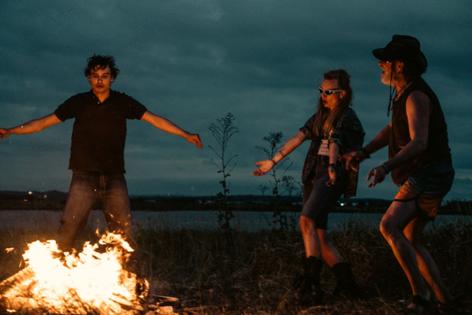Movie review: 'Urchin' a searing portrait of addiction and homelessness
Published in Entertainment News
It’s well into the second act of “Urchin,” writer/director Harris Dickinson’s searing portrait of addiction and homelessness in East London, before we see our protagonist, Mike (Frank Dillane) smile for the first time.
Up to this point, we’ve seen Mike at seemingly rock bottom, living a harrowing day-to-day existence on the street. When a good Samaritan tries to buy him a meal, Mike mugs the man for his watch and wallet, then is promptly arrested for the assault. After a prison stay, he works hard to claw his way back into society, assisted by a social worker, living in a hostel temporarily provided by the state, and working as a line cook in a low-rent hotel, where he’s finally, tentatively, making some friends.
As he cautiously joins the hotel receptionist Chanelle (Shonagh Marie) and kitchen dishwasher Ramona (Karyna Khymchuk) in their jokes and gossip, we see Mike’s twitchy demeanor open up for the first time, and he finally flashes that wide, genuine smile. It’s startling. He looks handsome, happy, just a guy to have a laugh with, not someone dangerous or pitiful.
The way we look (or don’t look) at people like Mike — the unhoused, the addicts, the otherwise abject — is the central question of Dickinson’s feature debut. The film is a deeply personal project for the actor-turned-filmmaker, inspired not only by where he grew up in London and people he knew, but also volunteer work he’s done with various charity organizations.
Dickinson and his cinematographer Josée Deshaies utilize a repeated visual motif of slow zooms throughout “Urchin” that underscores the film’s observational thesis. The camera captures Mike from afar before slowly, incrementally zooming in, as if picking him out from the crowd to really take a look at this one person.
The camera studies Mike as he carefully arranges his cardboard sleeping mat, and later, singing Atomic Kitten’s “Whole Again” with his hotel co-workers in a strangely moving karaoke scene. Again and again, the gaze creeps closer toward him, as if trying to penetrate his rhythms of recovery and relapse. Most importantly, it’s an attempt to really see this character, asserting his humanity with a restrained sense of compassion, without condescension or judgment.
Dickinson’s script doesn’t necessarily try to psychoanalyze Mike, and as a director, he provides a showcase for Dillane’s jaw-dropping performance, a heartbreaking blend of innocence and menace. Mike is possessed of a warm charm that’s often weaponized in his blinkered quest for drugs, and there’s a childlike quality about him, impulsive, hapless and restless.
Mike squirms awkwardly during a restorative justice session with his victim, Simon (Okezie Morro), offering only a flippant thumbs up when asked to speak. When being seduced by a French hippie, Andrea (Megan Northam) whom he met at a trash pickup job, he’s more focused on a candy than her physical overtures. Mike is many things, but he is always unpredictable. It’s as if he’s not quite built for this world, seemingly born without guile or savvy. Yet he is still capable of great destruction.
“Urchin” is situated within the lineage of deeply humanist English filmmakers like Mike Leigh, Ken Loach and Andrea Arnold who offer up unvarnished looks at the lives affected by sociopolitical structures. The influence of Agnes Varda’s classic “Vagabond” breathes throughout “Urchin” as well. But Dickinson isn’t just a social realist, he’s also a surrealist, and in his first outing as a filmmaker, he doesn’t shy away from getting a bit cosmic with it.
Mike’s eight-month stint in the slammer is visualized by a trip down a drain, through dark, organic, almost elemental images, then into a mossy forest cave. It’s a place of bizarre but serene quiet that Mike returns to again and again in his mind, as if dissociating. Sometimes he imagines a woman, a fiddler, guiding him on his journey. The film’s climax is an almost theatrical, abstract piece of filmmaking that rips us out of this painful reality and leaves the facts open to interpretation.
These experimental moments may not all entirely work, but they are deeply transporting and cerebral, suggesting a higher spiritual plane to Mike’s existence, pulling him out of the realm of the despairingly human and into some place out among the cosmos, or deep within the cells. It’s nice to watch a young filmmaker try it all out, to throw creative ideas at the wall and see what sticks.
But “Urchin” also reveals Dickinson’s quiet assurance as a filmmaker, his confidence in his lead actor, and in his belief that these stories matter, that characters like Mike matter. Dickinson, who became a heartthrob in movies like “Beach Rats,” “Triangle of Sadness” and “Babygirl,” announces that he’s much more than a pretty face, he’s got something to say, and the message of humanist compassion he delivers in “Urchin” is incredibly powerful.
———
'URCHIN'
3.5 stars (out of 4)
No MPA rating (language, nudity, violence, and onscreen drug use)
Running time: 1:39
How to watch: In theaters Oct. 17
———
©2025 Tribune Content Agency, LLC













Comments